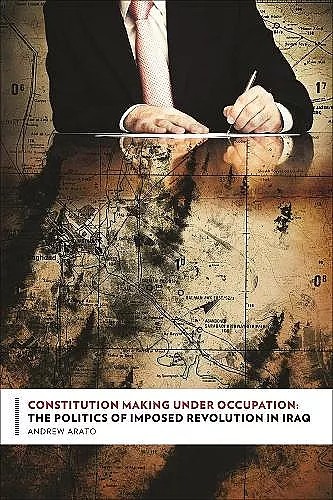Constitution Making Under Occupation
The Politics of Imposed Revolution in Iraq
Format:Hardback
Publisher:Columbia University Press
Published:24th Mar '09
Currently unavailable, and unfortunately no date known when it will be back

Andrew Arato's book is essential reading for anyone who wants to move beyond the myth of the constitution as the expression of the constituent power of the people and understand the actual process of contemporary constitution making. Having experienced transitional constitutionalism in postcommunist Central Europe and post-apartheid South Africa, Arato finds himself in the infinitely more turbulent waters of Iraq's American-imposed constitutional revolution yet makes admirable, comparative sense of the attempt as a failed case of what he calls two-stage, 'postsovereign' constitution making. -- Said Amir Arjomand, director of the Stony Brook Institute for Global Studies, president of the Association for the Study of Persianate Societies, and author of The Turban for the Crown: The Islamic Revolution in Iran A leading scholar of comparative constitutionalism, Andrew Arato shows remarkable breadth and erudition. He is equally at home in the world of social and political theory as well as the empirical realities of current politics, and his book will have clear and practical implications for policy. -- Nathan Brown, professor of politics and international relations, George Washington University, and author of The Rule of Law in the Arab World
The attempt in 2004 to draft an interim constitution in Iraq and the effort to enact a permanent one in 2005 were unintended outcomes of the American occupation, which first sought to impose a constitution by its agents. This two-stage constitution-making paradigm, implemented in a wholly unplanned move by the Iraqis and their American sponsors, formed a kind of compromise between the populist-democratic project of Shi'ite clerics and America's external interference. As long as it was used in a coherent and legitimate way, the method held promise. Unfortunately, the logic of external imposition and political exclusion compromised the negotiations. Andrew Arato is the first person to record this historic process and analyze its special problems. He compares the drafting of the Iraqi constitution to similar, externally imposed constitutional revolutions by the United States, especially in Japan and Germany, and identifies the political missteps that contributed to problems of learning and legitimacy. Instead of claiming that the right model of constitution making would have maintained stability in Iraq, Arato focuses on the fragile opportunity for democratization that was strengthened only slightly by the methods used to draft a constitution. Arato contends that this event would have benefited greatly from an overall framework of internationalization, and he argues that a better set of guidelines (rather than the obsolete Hague and Geneva regulations) should be followed in the future. With access to an extensive body of literature, Arato highlights the difficulty of exporting democracy to a country that opposes all such foreign designs and fundamentally disagrees on matters of political identity.
A comprehensive treatment of comparative constitutionalism...recommended. Choice
ISBN: 9780231143028
Dimensions: unknown
Weight: unknown
376 pages